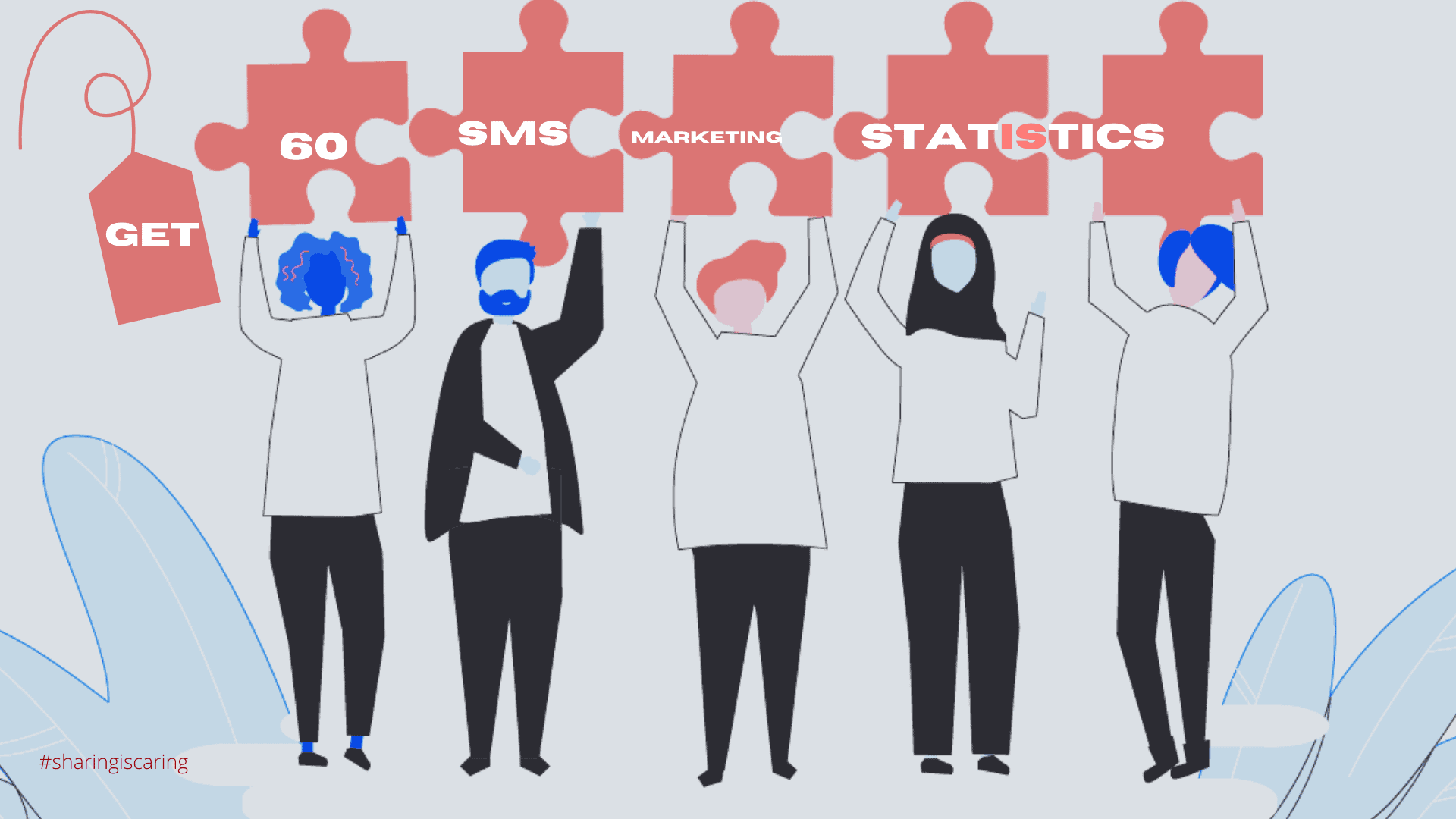When compiling the 60 absolute best SMS marketing statistics we could find, we didn’t cut any corners. Meaning we zero’d in on the why SMS marketing is a rapidly growing channel, as opposed to boring you with stats about how many people have a mobile phone, or how many texts get sent every day – it’s a lot, and we already knew that.
In this article, we focus on the text message marketing statistics that matter most to businesses and their marketing, sales, and customer support teams. Additionally, we cover why your customers want companies to text them, as well as how effective and efficient SMS marketing really is.
By the time you’re done reading through all of these great SMS marketing statistics, you should either be asking yourself why your company isn’t already engaging with your audiences via SMS/MMS, or why you’re not sending more SMS text messages to customers.
We’ve broken down the 60 SMS marketing statistics by category:
- What do consumers think of SMS marketing?
- Comparing SMS text messaging to other marketing channels
- How effective is SMS marketing?
- SMS marketing statistics & SMS sales statistics
- SMS statistics for customer support
- Text marketing trends in 2021 and beyond
- How to get started with text message marketing
What do consumers think of SMS marketing?
In general, it appears companies are afraid that they’ll be invading their customers’ privacy by sending them text messages. Which is why it’s not surprising that one of the most common questions concerning SMS marketing online is, “Is text marketing legal?”
The answer is: Yes, absolutely.
In almost all cases, people need to opt-in to receive texts from your business. And this is a good thing, because opting-in is a great signal that someone is a good prospect, quality lead, or is likely to convert with promotional offers or upsells.
A lot of online marketers laugh at the idea of SMS marketing services because they think it’s more regulated than email marketing. Fortunately, that’s not the case.
Other marketers shy away from text message marketing because it’s a new and therefore intimidating channel, or they feel it’s too intrusive to show up in their audiences’ text inbox. However, the data proves out that this idea is also not the case.
1. 75% of consumers are comfortable receiving SMS messages from brands as long as they opt-in to messaging.
2. 64% of consumers think businesses should contact them via text messages more often.
3. 75% of consumers want to receive texts with special offers.
If 3 out of 4 of all consumers would like to see special offers, discounts, and coupons delivered to their smartphones via SMS, you shouldn’t be worried about giving it a shot, right?
One recommended strategy for promotional text message marketing is to create a call-to-action that has a sense of urgency, such as a limited-time offer that needs to be redeemed by a specified date.
Another SMS strategy would be to encourage SMS/MMS recipients to share promotional offers with their family and friends in order to earn more points. Another interesting SMS strategy for e-commerce would be sending cart abandonment SMS to remind online purchasers about the products that they left in their shopping carts.
4. 75% of consumers are particularly frustrated when they can not respond to a text message from a business due to limitations with certain kinds of texting tools.
5. 56% of people surveyed would rather message a business than call customer service.
6. 67% of people would rather text with a business about appointments and scheduling than by email or phone.
7. 59% of users want their communications built into the phone – not as a separate app, that they need to download.
SMS is the preferred channel for consumers because opt-in is simple. Furthermore, they don’t have to download a brand’s app to receive notifications. Furthermore, SMS is more direct than a push notification from an app, and it won’t get lost in your email inbox.
8. 77% of consumers are likely to have a positive perception of a company that offers SMS.
9. Up to 80% of consumers preferred to track their orders via text when products were shipped.
The last couple of SMS marketing statistics we’ll include in this section highlights why SMS marketing in the USA is increasingly important. And it’s about the largest group of Americans and soon to be the highest spending group of American consumers – Millennials.
10. 83% of millennials open SMS messages within 90 seconds of receiving them.
11. 75% of millennials prefer SMS communications for deliveries, promotions, and surveys.
Contrary to popular belief, most people aren’t discouraged by promotional offers sent via text. This is due to a few key factors. Most notably, SMS marketing is actually less intrusive than other marketing channels because users must provide you permission to send them texts from your business.
After reading through these first 11 SMS marketing statistics, you should feel much more comfortable about whether or not you’ll be upsetting any of your customers or prospects.
Consumers are okay with companies sending them text messages, and even encourage their favorite brands to do so.
Comparing SMS Text Messaging to Other Marketing Channels
So how does text message marketing compare to other marketing channels? And what makes SMS different than other marketing channels?
The value of text message marketing is that it’s the most preferred way for billions of people to interact with one another. People keep their phones by their side at all times and are always ready to use them.
And once again, the SMS marketing statistics we’ve gathered make that crystal clear.
12. Consumers are more likely to open text messages before any other form of mobile communication.
13. In fact, consumers preferred channels for receiving brand updates are as follows:
- SMS: 48%
- Email: 22%
- App notifications: 20%
- Direct mail: 8%
14. SMS messages have a 98% open rate compared to 20% of emails.
15. The average response time for a legitimate email is about 90 minutes, compared to 90 seconds for a text message.
16. Only 10% of SMS marketing messages are spam, compared to nearly 49.7% of emails.
17. The response rate of SMS text message marketing is 45% vs email response rates at 6%.
Additionally, engagement rates are also much higher when comparing SMS marketing and email marketing.
18. 19% of links in text messages are clicked vs 2% of links in emails.
19. SMS messages have an average click-through rate of 36%, while email click-through-rates are a dismal 3.4%.
20. When it comes to sales, 90% of leads prefer to be texted, compared to being called on the phone.
21. 55% of consumers prefer SMS for appointment reminders vs 35% of consumers who prefer email for those notifications.
Unlike a website, SMS marketing is a persistent channel. Your website isn’t a persistent channel, because when a lead leaves your website without you capturing any of their information, they’re gone.
How Effective is SMS Marketing?
Short answer: Pretty darn effective.
22. 98% of Sent Text Messages are Read.
23. SMS messages have a 209% higher response rate than phone, email, or Facebook.
24. It only takes 90 seconds on average for a person to respond to a text message.
25. 90% of SMS messages are read within 3 minutes of being received.
26. Furthermore, 95% of texts that are read and responded to happen within 3 minutes of delivery.
When comparing different industries response rates, here are five of the largest industries and their results:
27. SMS response rates within the first 15 minutes of delivery.
- Retail: 32%
- Betting & Trading: 33%
- Entertainment: 37%
- Travel & Transportation: 54%
- Finance & Banking: 57%
28. Sending business appointment reminders to customers through SMS reduced missed appointments by 26%.
29. 91% of users who opt-in to receive texts from a brand see those messages as “somewhat useful” or “very useful”.
The numbers don’t lie. Text message marketing, by far, has the best engagement rate of any marketing channel. Furthermore, mobile marketing is as fast as it gets for both delivery and response times.
SMS Marketing Statistics & SMS Sales Statistics
The following 16 SMS marketing statistics should convince marketing and sales teams to give text marketing serious consideration because they demonstrate that companies who are not adopting SMS as a channel, are likely losing out on substantial revenue.
30. 31% of consumers respond to SMS surveys, with an average response time of fewer than six minutes.
31. SMS produces engagement rates six to eight times higher than retailers normally achieve via email marketing.
32. 48% of Internet consumers said they would prefer to receive their loyalty-related messages via SMS.
33. 50% of US consumers make direct purchases after they’re sent an SMS branded text, a discount coupon, or a QR code.
34. Consumers who get SMS marketing messages are 40% more likely to convert than those who don’t.
35. SMS produces engagement rates 6-8 times higher than retailers normally achieve via email marketing when used for redemption, data collection, and brand awareness.
36. Coupons delivered via SMS have redemption rates 10 times higher than those of printed coupons.
37. 64% of US smartphone owners said they would like to receive service-based messages from retail stores.
38. 55% of US consumers said they would like to receive service-based messages from travel companies and delivery/restaurant businesses.
Remember, they have to opt-in with an SMS keyword or some other way. So, consumers don’t need to receive your text messages if they don’t want to. Plus, they can always opt-out, which is why we recommend including an opt-out keyword, such as STOP.
39. 90% of customers say they have gained value from SMS loyalty programs.
40. 83% of marketers promoting email subscription via SMS said it was “very effective/effective.”
41. Using short, branded links in your mobile marketing campaigns can help improve conversions by up to 34% which is why we recommend using a URL shortener like Rebrandly.
The reason why the click-through rate of branded links is much higher than that of short, generic links is that branded links are more easily trusted, as opposed to bit.ly/952769112, something like chatbots.org/sms-tools looks a lot nicer, tells you what to expect when you click on it, and it uses a brand name.
42. 96% of marketers rated mobile welcome SMS as “very effective/effective” or “somewhat effective.”
43. 77% of consumers said they opted-in to a brand’s text messages to receive coupons or deals.
44. 33% of consumers said they opted-in to a brand’s text messages to gain access to more meaningful content.
45. 41% of consumers said they didn’t opt-in to a brand’s text messages because the texts didn’t provide meaningful content.
SMS Statistics for Customer Support
Text is makes it easy to communicate with your customers because it’s instant, convenient, and universal. And the best live chat software allows you to proactively engage with customers and prospects in order to grow revenue, qualify leads, and offer real-time support across multiple channels – including SMS.
46. Consumers in the US prefer SMS over voice calls for customer service.
47. More than 50% of customers prefer contacting support through text messaging compared to all other major communication channels.
48. 70% of consumers want to use mobile messaging to troubleshoot issues.
49. 68% of consumers would like to use mobile messaging to contact a company with billing questions or concerns.
50. 71% of consumers — say using text messaging to communicate with a business was effective.
51. 97% of companies found they communicated with consumers more efficiently after launching texting initiatives.
52. 39% of businesses use some form of texting to communicate with their customers.
Your customers want to use text for customer support issues. These numbers should have you thinking about the impact SMS could have on your business if you offered live chat support with SMS as an option, in addition to your other support channels.
Text Marketing Trends in 2020 and Beyond
Text message marketing is a massively underused marketing channel in general, and for that reason, it can be the perfect complement to your overall marketing strategy. And it’s growing, fast!
53. Compared to 2016, 23% more people will opt-in to receive SMS messages from companies in 2020.
54. 7 million people will choose to receive business SMS messages in 2020.
55. About 61% of marketers still don’t use SMS. If you start now you’ll be on the cutting edge.
56. Despite SMS marketing statistics that prove SMS marketing is effective, 65% of brands still don’t have a formal strategy in place for bulk SMS messaging to take advantage of the amount of time we spend on our phones.
57. Polls predict that by 2020, 85% of interactions between brands and customers will be managed without speaking.
58. The use of SMS marketing grew 197% as a strategy in B2B efforts from 2015 to 2017.
59. Despite the SMS boom, 61% of businesses have yet to embrace the platform.
60. 73% of brands expect their SMS marketing budget to increase in 2020.
Hopefully there’s no doubt left in your mind that SMS marketing is a highly viable and even necessary marketing channel. Don’t pass up the opportunity to grow your customer base with text message marketing in 2020.
Getting started with SMS text message marketing
Now that you know the most important SMS marketing statistics, it’s time to learn how to run great SMS marketing campaigns.
Watered-down, mobile-targeting tactics are costing you conversions, clients, and revenue. Meanwhile, SMS marketing is lurking in the background, waiting for you to capitalize on it.
So, take a look at these two articles of “SMS Marketing Examples” and “How To Send a Text Message Blast.”
Or, watch our video on “How To Do Text Message Marketing.”
SMS marketing is the fastest way to reach the more than 5 billion people that send and receive text messages around the world. And that’s because it’s instant, convenient, and universal.





